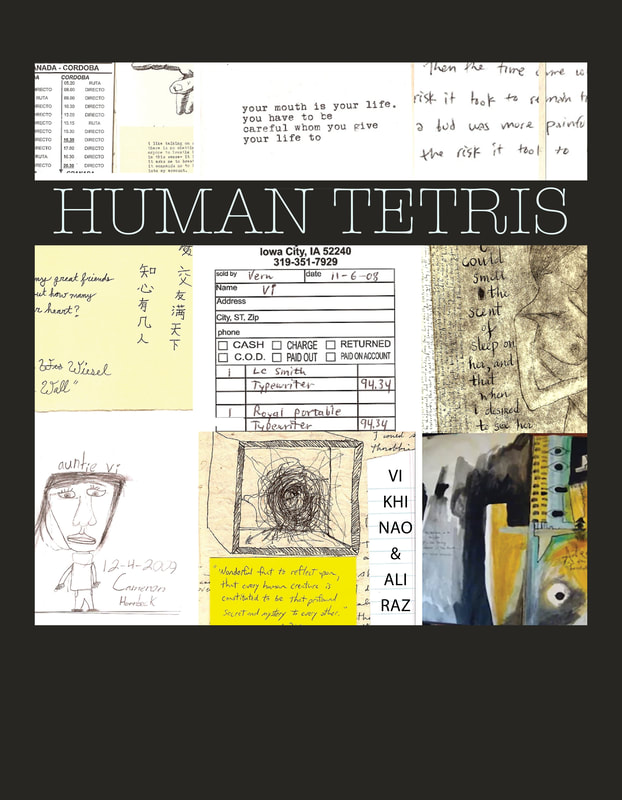
11:11 Press, 2019
INTERVIEW BY MIKE CORRAO
—
I recently had the chance to sit down with Vi Khi Nao and Ali Raz to talk to them about their new book, Human Tetris (11:11 Press 2019), which repurposes the style of newspaper personals and online dating to explore the shape of desire.
MIKE CORRAO: I’m fascinated by the haptic nature of Human Tetris. It’s a book that you’re compelled to rotate and turn as you read. It’s something that has to exist in the physical world to fully reveal itself. Do you want the reader to recognize these qualities in the text? Do you want them to always know that they have this physical object in their hands?
VI KHI NAO: I think we want our readers to acquire the services of a chiropractor. Neck discomfort may be our thing, though only time can tell what other parts might be activated or stimulated by this text. The physicality and rotational quality are born like the game itself, where desire falls on itself and if it falls too fast and the player is unable to sort it organically, it can get entangled. Desire can be a game. Or the number 4. A book as a video game has more interactive dimensions than a book as a book. We might want the players or readers to tap into the reality of desire, its humor and its playful darkness. The book itself is very tetragonally light.
MC: The craning of the neck that you mention leads me to think of the ways that a book can afflict its readers with certain ailments. The immediate answer is weight, but there are other ways (through rotation or small typesets) that books can place strain on the reader. Is this what you would like Human Tetris to do to some extent? Would you like it to create discomfort in its reader?
ALI RAZ: Not wedded to the idea of exacting bodily violence on prospective readers; metaphysical is another thing. Which is to say that I’m not hoping to create either comfort or discomfort, and I imagine that if the latter occurs the reader, if wise, will stop reading. Nothing, I hope, would compel them to prolong their physical discomfort. There’s something to be said about choosing your own pain/pleasure, but ultimately I’m more drawn to the pleasures of reading, which are not simple, than its pains.
VKN: The discomfort only exists on a corporeal plane for the readers. Everything else shouldn’t be about pain, soreness, or psychic confusion, perturbation, or hardship. If it does produce such results, the readers aren’t on the right video game with us.
MC: The language of Human Tetris is reminiscent of the more digital and abstract spaces that we go when we seek companionship. Reading the text, I’m often reminded of forum posts or online dating – the ambiguous wall of disembodied voices. Imagery varying between the apiary, the cybernetic, the caffeinated. When assembling these iso (in search of) posts, did you picture them as coming from disparate sites across the internet or a singular location? Do they radiate out from the same point? Are there real people behind these voices? Or do you see them as strictly linguistic creatures? Or another way entirely?
VKN: I view the book as a literary video game for writers. It appears interactive, but not really. It appears as if there are two or more players, but it’s just adverbs having lucrative careers with stand-up comedy. It resembles the aftermath of programming more than anything human, sexual, or linguistic. Even desire is texture and has no narrative construct or philosophy of being.
AR: Online forums, dating apps – or a real-world bathroom wall. Disembodied voices get close to it. I can’t imagine many of the texts actually cropping up in a dating scenario, whether on- or off-line. It was, for me, very much a literary undertaking in the sense of moving through language, being animated by language: desire in the abstract rather than anything approaching the real, messy thing. Another way of putting this would be to acknowledge the text as a catalog of un-kinks and anti-love. Not only divorced from flesh-and-blood reality but negating it, violently making fun of it. Which is maybe what much of the internet does anyway, even in its mushier corners.
MC: I like this label of un-kinks. Throughout the book, there is an erotics of destruction /consumption/augmentation. There is a desire to consume or be consumed/destroy or be destroyed by your prospective lovers. “You want pasta; I eat your honeyed clit.” / “ISO women who are bad carbohydrates, carbonated lemonade…” Not sure if I’ve got a question here, but it’s a detail I’m really fascinated by if you’d like to talk more about it.
AR: There’s something to the idea of the various thresholds of consumption that run alongside daily life and speech. Biting someone’s head off, wanting to eat a cute baby: there’s not a whole lot that marks even simple linguistic boundaries between anger and love. I don’t think there’s anything new in this idea but it greys, for me, into the totally seductive manner in which so much of erotics flickers back and forth between sex and straight-up violence. Kinks and un-kinks.
There’s this, and then there’s the plain old idea of food as sex by other means. Plain, but compelling. For anyone who doesn’t know it yet, Vi is an outstanding cook.
MC: This is a collaborative book. Is it the first time that either of you has done this large scale of a collaboration? How did it come about?
AR: Definitely the first time for me. It was instructive; adapting to the presence of another in this single text. The most interesting thing that came about was moments of uncanny synchronicity: times when Vi and I, unknown to each other, would end up writing about the same things, images, the same concepts, and only realize after the fact. So there’s a text, and there are two people doing various things to it and it begins to feel like there are three of us altogether, Vi and me and a process.
VKN: I have done collaborative work with others (writers, poets, playwrights, filmmakers, musicians, etc.) before. They haven’t had a chance to get born or publicized or celebrated yet, so it appears as if this collaborative effort is new or first. I was getting sick of reading boring personals that should not be personals and I asked Ali Raz if she would be interested in creating ‘fake’ ones for a book and she said yes. I mean, how does one go about creating personals that are impractical and nonfunctional? Whose existence is designed to pull a quixotic philosopher from the imagination and not from reality? How does one make love to a concept?
MC: On a similar note, I’m curious about the process itself. How did the two of you go about assembling this project? Was it the two of you working separately within the same premise and then compiling the results? Did you work as a hive mind – writing each page together one by one?
VKN: I wrote the first poem and Ali wrote the second and then we alternated. We executed the exercise over an entire month of December. We each wrote one a day and submit it to each other. We had twenty-four hours to create one. Each day is a ruler, which measures our imagination and displays such an imagination via texts. It is a game for ourselves and not against ourselves. Though I can’t entirely say that time was our opponent or adversary. Perhaps it was our supporter even.
MC: Due to the nature of the formatting, Human Tetris has a pretty fast pace. That, paired with the style of the pieces, made reading the text feel like looking over the interface of a social media site. Like each page was a thread leading to a potential encounter or comment section or reply. How fast do you expect your reader to move? Do you want them to linger on each segment?
VKN: I want the readers to not eat a bucket of ice cream after reading each segment. I want the readers to move slowly as if they have been paused in a video game. I want them to experience erotic glitches as if the book has fallen from a 50-story building and the print screen is cracked, its palimpsest reset. Even if the medium refuses to be confused by another medium.
AR: I like your observation, Mike, about the experience of reading the book being like browsing social media. It moves in the same sort of digestible chunks. That said, as Vi notes, it’s probably not a good idea to consume a lot of these ‘digestible chunks’ in one sitting. I don’t have any stake in wanting a reader to read the book one way rather than another, but I’d be intrigued to know what makes the book feel fast or slow as the case may be.
MC: Vi, you mention a desire for erotic glitches. Often a writer will do their best to place their reader in a passive position, creating a large fantasy around their heads. Human Tetris instead fixates on the mechanical qualities of the video game.
VKN: I want readers to see the mirrors of their desire and laugh at them. Our culture takes sex too seriously. The films I watch – lovers are rarely shown laughing hysterically in bed. Erotic glitches break the mirror of fantasy.
AR: Laughter as emotional overload, aka glitch.
MC: Ali, in some of your short pieces, you’ve taken an unconventional approach to artist bios. One saying, “Ali Raz is a cyborg…” another saying, “believes in synchronicity.” Do you consider these to be extensions of the work that they are attached to? Do you see yourself as diegetic to each new fiction or poem you make?
AR: Holy smokes, no! The idea of being of a piece with a text is, to be frank, kind of horrifying. I’d rather be hoping for the opposite: a total split between the thing in the bio and the thing in the text. Which is why I’m drawn to lean, opaque bios that, when they’re not completely terse, don’t really say anything either. More and more now, I’m drawn to the simple, inoffensive bio, the opposite of a cyborg declaration: something so standard and innocuous it slips through the cracks.
MC: Do you listen to music when you write? Is there a genre or artist whose music provokes or inspires you to create your work?
AR: I’m musically slow: stuck in the same loops of music for months, years. Probably everyone else on the planet has a more sophisticated relationship to music than I do.
VKN: Silence is mine.
MC: Vi, this is your eleventh published book. You’ve released work with a variety of different presses. What’s your process for deciding which publisher is the best fit for a given title?
VKN: Some presses write to request a manuscript from me. Others I seek out through a submission window or opportunity (Fish in Exile). A few from writing contests (The Old Philosopher, A Brief Alphabet of Torture). Sometimes there is no best fit, just being at the right place at the right time with a particular publisher. Sometimes the universe helps me out by preventing a particular manuscript from being born as a way of protecting me from terrible publishers. We want some of our soulmates to wear thongs in the relationship without resorting to olive oil or ancient Greece.
MC: I’m always curious to hear what kind of work authors engage with. Were you reading anything as you wrote Human Tetris? Do you tend to read a lot? Do you read more contemporary titles or older works?
VKN: I don’t read. I try to have a vibrant, impotent, prolific sex life with as many books and films as possible. Organically.
 VI KHI NAO is the author of three poetry collections, Sheep Machine (Black Sun Lit, 2018), Umbilical Hospital (Press 1913, 2017), and The Old Philosopher (winner of the Nightboat Prize for 2014), the short stories collection A Brief Alphabet of Torture (which won FC2’s Ronald Sukenick Innovative Fiction Prize in 2016), and a novel, Fish in Exile (Coffee House Press, 2016). Her work includes poetry, fiction, film and cross-genre collaboration. Her stories, poems, and drawings have appeared in NOON, Ploughshares, Black Warrior Review and BOMB, among others. Vi holds an MFA in fiction from Brown University.
VI KHI NAO is the author of three poetry collections, Sheep Machine (Black Sun Lit, 2018), Umbilical Hospital (Press 1913, 2017), and The Old Philosopher (winner of the Nightboat Prize for 2014), the short stories collection A Brief Alphabet of Torture (which won FC2’s Ronald Sukenick Innovative Fiction Prize in 2016), and a novel, Fish in Exile (Coffee House Press, 2016). Her work includes poetry, fiction, film and cross-genre collaboration. Her stories, poems, and drawings have appeared in NOON, Ploughshares, Black Warrior Review and BOMB, among others. Vi holds an MFA in fiction from Brown University.
 ALI RAZ received an MFA in Fiction from the University of Notre Dame. Her work has appeared in 3:AM Magazine, Tupelo Quarterly, Occulum, Queen Mob’s Teahouse, and elsewhere. She lives in Los Angeles.
ALI RAZ received an MFA in Fiction from the University of Notre Dame. Her work has appeared in 3:AM Magazine, Tupelo Quarterly, Occulum, Queen Mob’s Teahouse, and elsewhere. She lives in Los Angeles.
—
 MIKE CORRAO is the author of three books, Man, Oh Man (Orson’s Publishing), Two Novels (Orson’s Publishing) and Gut Text (11:11 Press), one chapbook, Avian Funeral March (Self-Fuck), and many short films. Along with earning multiple Best of the Net nominations, Mike’s work has been featured in publications such as 3:AM, Collagist, Always Crashing, and The Portland Review. He lives in Minneapolis. Learn more at www.mikecorrao.com
MIKE CORRAO is the author of three books, Man, Oh Man (Orson’s Publishing), Two Novels (Orson’s Publishing) and Gut Text (11:11 Press), one chapbook, Avian Funeral March (Self-Fuck), and many short films. Along with earning multiple Best of the Net nominations, Mike’s work has been featured in publications such as 3:AM, Collagist, Always Crashing, and The Portland Review. He lives in Minneapolis. Learn more at www.mikecorrao.com
![[PANK]](https://pankmagazine.com/wp-content/themes/pank/assets/images/pank-logo-large.png)

